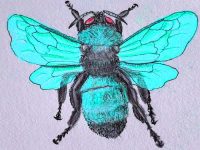| 500Foods shared this story from |

Fake honey is an enormous economical burden on beekeepers and consumers around the world. Adulteration methods are becoming more and more sophisticated. Besides the old-fashioned scams of real honey getting diluted or replaced by syrup, new tricks show up, for example pollen getting blended into syrup, chemical alteration of syrup to confuse tests, fake honey traveling through a number of countries to mask its country of origin, or a combination of these methods. Since the adulterated honey does not pose a risk to consumer’s health, government enforcement to detect and punish honey adulteration has not been very strong. So far, authenticity tests are mostly left to the private sector and the honey industry.
Resource
- Copeland, C. (August 26, 2020). “Honey is one of the most faked foods in the world, and the US government isn’t doing much to fix it“. Business Insider.
The post To Bee Or Not To Bee appeared first on FoodSafetyTech.

